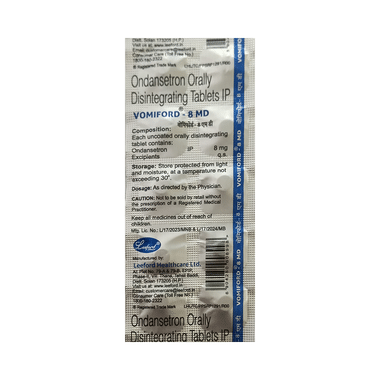Optus 8mg Tablet MD
 Prescription Required
Prescription Required

Product introduction
Optus 8mg Tablet MD may be used alone or with other medications and can be taken with or without food. Your doctor will suggest the appropriate dose depending on what you are taking it for. The first dose is normally taken before the start of surgery, chemotherapy, or radiotherapy. After these treatments, take any further doses as prescribed by your doctor (normally only for a few days at most). Take it regularly at the same time(s) each day to get the most benefit. Be careful not to take too much.
Optus 8mg Tablet MD does not relieve other side effects associated with cancer treatments. Also, it has little effect on vomiting caused by motion sickness. The most common side effects of taking this medicine include headache, diarrhea or constipation, and feeling tired. These symptoms should disappear when you stop taking the medicine. However, if these side effects bother you or do not go away, your doctor may be able to suggest ways of preventing or reducing them.
Before taking Optus 8mg Tablet MD, tell your doctor if you have heart or liver problems or a blockage in your stomach or intestines. Also, tell your doctor about any other medicines you might be taking, especially medicines to treat epilepsy, heart problems, cancer, and depression. These may affect, or be affected by, this medicine. If you are pregnant or breastfeeding, ask for advice from your doctor.
Uses of Optus Tablet MD
Benefits of Optus Tablet MD
In Treatment and prevention of Vomiting
In Treatment and prevention of Nausea
Side effects of Optus Tablet MD
Common side effects of Optus
- Fatigue
- Headache
- Constipation
- Diarrhea
How to use Optus Tablet MD
How Optus Tablet MD works
Safety advice
However, inform your doctor if you have an underlying kidney disease. Limited information is available in patients taking this medicine for more than one day.
What if you forget to take Optus Tablet MD?
All substitutes
Quick tips
- You have been prescribed Optus 8mg Tablet MD for the prevention of nausea and vomiting caused by surgery or due to chemotherapy and radiotherapy.
- It is fast-acting and starts working within 30 minutes.
- If you vomit within one hour of taking a dose, take another dose.
- Avoid heavy meals and try eating small, nourishing snacks throughout the day. Also, sip water regularly to help avoid dehydration.
Fact Box
Interaction with drugs
Patient concerns
FAQs
How quickly does Optus 8mg Tablet MD work?
What are the side effects of Optus 8mg Tablet MD?
When should you take Optus 8mg Tablet MD?
Is Optus 8mg Tablet MD a steroid?
Does Optus 8mg Tablet MD work for seasickness?
Disclaimer:
Tata 1mg's sole intention is to ensure that its consumers get information that is expert-reviewed, accurate and trustworthy. However, the information contained herein should NOT be used as a substitute for the advice of a qualified physician. The information provided here is for informational purposes only. This may not cover everything about particular health conditions, lab tests, medicines, all possible side effects, drug interactions, warnings, alerts, etc. Please consult your doctor and discuss all your queries related to any disease or medicine. We intend to support, not replace, the doctor-patient relationship.References
- Sharkey KA, Wallace JL. Treatment of Disorders of Bowel Motility and Water Flux; Anti-Emetics; Agents Used in Biliary and Pancreatic Disease. In: Brunton LL, Chabner BA, Knollmann BC, editors. Goodman & Gilman’s: The Pharmacological Basis of Therapeutics. 12th ed. New York, New York: McGraw-Hill Medical; 2011. pp. 1341-42.
- Katzung BG. Histamine, Serotonin, & the Ergot Alkaloids. In: Katzung BG, Masters SB, Trevor AJ, editors. Basic and Clinical Pharmacology. 11th ed. New Delhi, India: Tata McGraw Hill Education Private Limited; 2009. p. 285
Marketer details
Lab tests offered by us







